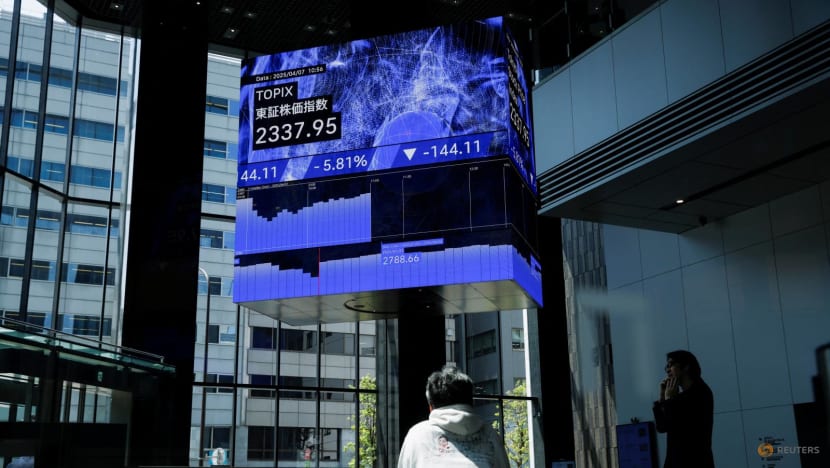Asian stocks waver, dollar sags under weight of Trump tariffs, US Fed uncertainty

A man watches a stock quotation board at a brokerage in Tokyo, Japan on Apr 7, 2025. (File photo: REUTERS/Androniki Christodoulou)
SINGAPORE: Asian stocks stumbled on Wednesday (Jul 2) and the dollar languished near three-and-a-half-year lows as investors pondered the prospect of US interest rate cuts and the scramble for trade deals ahead of President Donald Trump's Jul 9 deadline for tariffs.
Trump said he was not considering extending the deadline for countries to negotiate trade deals with the United States, and cast doubts again that an agreement could be reached with Japan, although he expects a deal with India.
MSCI's broadest index of Asia-Pacific shares outside Japan eased 0.13 per cent in early trading, inching away from the November 2021 top it touched last week.
Tech stocks led Japan's Nikkei, Taiwan stocks and South Korea's Kospi Index lower, tracking US technology firms.
"You've seen it with other trade negotiations that they take years if you want to do them properly," said Matthias Scheiber, senior portfolio manager and the head of the multi-asset solutions team at Allspring Global Investments.
"It's not something you negotiate within a week. I think that's also what the US is realising now. If the tariffs get ramped up again and the situation sours, short term, we can definitely see some volatility."
Data on Tuesday showed the US labour market remained resilient with a rise in job openings for May, sharpening the focus on the payrolls report due on Thursday as investors try to gauge when the Federal Reserve is likely to cut rates next.
Fed Chair Jerome Powell, under fire from Trump to cut rates immediately, reiterated that the US central bank plans to "wait and learn more" about the impact of tariffs on inflation before lowering interest rates.
Traders are pricing in 64 basis points of cuts this year from the Fed with the odds of a move in July at 21 per cent.
That maintained a bearish bias on the dollar. The euro last bought US$1.1794, just below the three-and-half-year high it touched on Tuesday. The yen was steady at 143.66 per dollar.
"Any disappointing economic data can prompt further dovish repricing of FOMC rate cuts and another round of USD selling," said Carol Kong, a currency strategist at Commonwealth Bank of Australia.
Related:
TRUMP'S BILL
Investor focus over the last few days has pivoted to the progress of Trump's massive tax-and-spending Bill, which is expected to add US$3.3 trillion to the national debt. The legislation heads to the House of Representatives for possible final approval after US Senate Republicans passed it by the narrowest of margins.
The Bill has stoked fiscal worries but the reaction was relatively muted after it passed the Senate. The benchmark US 10-year yields were steady at 4.245 per cent, having touched a two-month low in the previous session.
Aninda Mitra, head of Asia macro strategy at BNY Investment Institute, said the legislation "hard wires" a steady deterioration of the fiscal position and the debt trajectory of the US government.
"The near-term impact is mostly in the price, but the uncertainty factor could keep term premia elevated. We don’t think long-term yields will fall back materially in the 6 to 12-month horizon."
The fiscal worries, trade uncertainties and the US rate path trajectory have all led investors to flee US assets and look for alternatives. Investors worry that Trump's chaotic trade policies could hit US economic growth.
That has left the dollar unloved, with the greenback down over 10 per cent for the year in its worst first half performance since the 1970s. The dollar index, which measures the US currency against six rivals, was at 96.649, near its lowest since March 2022.
In commodities, spot gold eased to US$3,332.19 per ounce, after surging 1 per cent in the previous session. The yellow metal is up 27 per cent this year on safe-haven flows.












